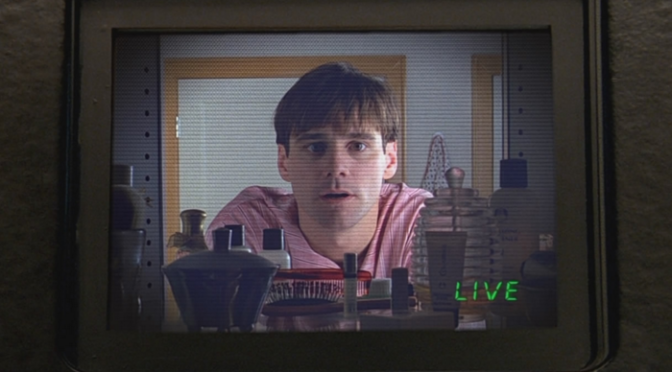At the time of its release in 1998, Peter Weir’s The Truman Show seemed like almost an impossible concept to fathom. After all, before the advent of social media, how could it possibly be anything other than a sci-fi conception to be able to be watched and monitored at all times–for everyone to know exactly what you’re doing and where? Though, of course, in Truman Burbank’s (Jim Carrey) case, he has no idea that he’s on his own TV show, which has been broadcasting live twenty-four hours a day for the past thirty years of his life. His obliviousness to the somewhat overt signs of a false reality is explained by the director of the show, Christof (Ed Harris), who asserts, “We accept the reality of the world with which we are presented. It’s as simple as that.” This philosophy goes deeper when taking into account that the things people post on Instagram, Facebook, etc. are merely components of the false reality they want others to believe they’re living.
But despite a carefully cultivated universe, it’s only a matter of time before the fortitude of a fate he has no interest in is questioned by Truman, whose very last name is emblematic of artificiality when considering that the set of his life on the fictional Seahaven Island is located behind the Hollywood sign (very near Burbank). His resentment toward the way his “destiny” keeps going against what he wants begins in his preadolescence, when Christof decides to get rid of his father, Walter (Brian Delate), while the two are sailing together so that Truman will develop a fear of water and thus be too traumatized to leave the island. The intensification of the latent bitterness he feels continues during his college years when he meets a girl named Lauren Garland (Natascha McElhone), someone he falls in love with at first sight. But this isn’t in Christof’s script, as his plans involve thrusting the hyper-fake Meryl (Laura Linney) at him so that they will eventually get married. But this doesn’t stop Truman from finding a moment to steal away with Lauren (whose name she later confesses is really Sylvia) on the beach. Knowing that someone is going to come for her soon, she urgently tells him that his life is a fabrication. He doesn’t understand–or perhaps doesn’t want to believe–what she’s saying. And before he can talk with her any further, Sylvia’s fake dad comes to tell Truman that she’s schizophrenic and doesn’t know what she’s saying and that they’re moving to Fiji. From this point on, Truman develops an obsession with finding her, but to no avail.
The more lax the crew behind The Truman Show becomes (e.g. accidentally changing the frequency on his radio so that he can hear his actions being monitored), the more he can’t deny the conspiracy afoot. Like so many children of the social media generation, Truman makes the prophetic statement, “Maybe I’m losing my mind, but, it feels like the whole world revolves around me somehow.”
Andrew Niccol’s (who would continue his penchant for sci-fi motifs with S1m0ne and In Time) then unique script–which would soon after be vaguely imitated by Ron Howard’s Edtv the following year–predicted more than just the future of technology’s ability to track our every move, as well as our own desire for our every move to be documented. It also foreshadowed the collective population’s freakish need to watch the lives of others unfold “uncensored” on a TV screen before them–as though finding comfort in knowing that there exists people “like us” with everyday problems that are, apparently, best encapsulated by the Kardashians.






















